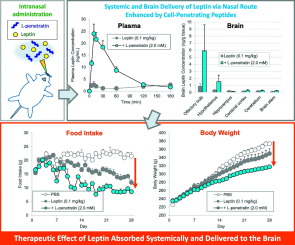当前位置:
X-MOL 学术
›
J. Control. Release
›
论文详情
Our official English website, www.x-mol.net, welcomes your
feedback! (Note: you will need to create a separate account there.)
Systemic and brain delivery of leptin via intranasal coadministration with cell-penetrating peptides and its therapeutic potential for obesity.
Journal of Controlled Release ( IF 10.5 ) Pub Date : 2020-01-09 , DOI: 10.1016/j.jconrel.2020.01.016 El-Sayed Khafagy 1 , Noriyasu Kamei 2 , Yui Fujiwara 2 , Haruka Okumura 2 , Teruyo Yuasa 2 , Masahiro Kato 2 , Kenji Arime 2 , Anna Nonomura 2 , Hideyuki Ogino 2 , Serena Hirano 2 , Sayaka Sugano 2 , Mariko Takeda-Morishita 2
Journal of Controlled Release ( IF 10.5 ) Pub Date : 2020-01-09 , DOI: 10.1016/j.jconrel.2020.01.016 El-Sayed Khafagy 1 , Noriyasu Kamei 2 , Yui Fujiwara 2 , Haruka Okumura 2 , Teruyo Yuasa 2 , Masahiro Kato 2 , Kenji Arime 2 , Anna Nonomura 2 , Hideyuki Ogino 2 , Serena Hirano 2 , Sayaka Sugano 2 , Mariko Takeda-Morishita 2
Affiliation

|
Leptin is an endogenous hormone that regulates the appetite, energy metabolism, and glucose intake in the central nervous system (CNS) and is a potential therapeutic agent for obesity. In the normal healthy condition, peripherally secreted leptin is transported across the blood-brain barrier (BBB) to the target brain site, in particular the hypothalamus. However, it was reported that the progression of obesity causes diminished permeation of leptin across the BBB. The present study therefore aimed to effectively deliver leptin to the brain via intranasal coadministration with penetratin, an amphipathic cell-penetrating peptide (CPP), for potential treatment and prevention of obesity. The single administration study with normal rats demonstrated that leptin coadministered with L-penetratin was efficiently absorbed into the systemic circulation and accumulated in the anterior part of brain. Furthermore, chronic delivery of leptin via repeated intranasal coadministrations with L-penetratin suppressed the appetite and the body weight increase of the rats and lowered their plasma triglyceride levels. Analysis of brain samples after repeated administration suggested that Stat3 phosphorylation via leptin receptor stimulation potentially contributed to the therapeutic effect of leptin in the CNS. Thus, the present study suggests that intranasal coadministration with CPPs will become a promising strategy for delivering leptin to treat and prevent the progression of obesity.
中文翻译:

瘦素通过鼻内与细胞穿透肽共同给药的全身和脑部递送及其对肥胖症的治疗潜力。
瘦素是一种内源激素,可调节食欲,能量代谢和中枢神经系统(CNS)的葡萄糖摄入,并且是肥胖症的潜在治疗剂。在正常健康状况下,外周分泌的瘦素通过血脑屏障(BBB)转运至目标大脑部位,尤其是下丘脑。然而,据报道,肥胖的进展导致瘦蛋白在整个BBB中的渗透减少。因此,本研究旨在通过鼻内与两性细胞穿透肽(CPP)穿透肽共同给药有效地将瘦素递送至大脑,以潜在地治疗和预防肥胖症。与正常大鼠进行的单次给药研究表明,瘦素与L-渗透素合用可有效吸收到全身循环中并积聚在脑前部。此外,通过反复鼻内与L-渗透素共同给药长期输送瘦素,可抑制大鼠的食欲和体重增加,并降低血浆甘油三酯水平。重复给药后对脑样本的分析表明,通过瘦素受体刺激引起的Stat3磷酸化可能有助于瘦素在中枢神经系统的治疗作用。因此,本研究表明,鼻内与CPPs共同给药将成为输送瘦素治疗和预防肥胖症发展的有前途的策略。通过反复与L-penetratin鼻内共同给药长期提供瘦素,可抑制大鼠的食欲和体重,降低血浆甘油三酯水平。重复给药后对脑样本的分析表明,通过瘦素受体刺激引起的Stat3磷酸化可能有助于瘦素在中枢神经系统的治疗作用。因此,本研究表明,鼻内与CPPs共同给药将成为输送瘦素治疗和预防肥胖症发展的有前途的策略。通过反复与L-penetratin鼻内共同给药长期提供瘦素,可抑制大鼠的食欲和体重,降低血浆甘油三酯水平。重复给药后对大脑样本的分析表明,通过瘦素受体刺激引起的Stat3磷酸化可能有助于瘦素在中枢神经系统的治疗作用。因此,本研究表明,鼻内与CPPs共同给药将成为输送瘦素治疗和预防肥胖症发展的有前途的策略。重复给药后对脑样本的分析表明,通过瘦素受体刺激引起的Stat3磷酸化可能有助于瘦素在中枢神经系统的治疗作用。因此,本研究表明,鼻内与CPPs共同给药将成为输送瘦素治疗和预防肥胖症发展的有前途的策略。重复给药后对脑样本的分析表明,通过瘦素受体刺激引起的Stat3磷酸化可能有助于瘦素在中枢神经系统的治疗作用。因此,本研究表明,鼻内与CPPs共同给药将成为输送瘦素治疗和预防肥胖症发展的有前途的策略。
更新日期:2020-01-09
中文翻译:

瘦素通过鼻内与细胞穿透肽共同给药的全身和脑部递送及其对肥胖症的治疗潜力。
瘦素是一种内源激素,可调节食欲,能量代谢和中枢神经系统(CNS)的葡萄糖摄入,并且是肥胖症的潜在治疗剂。在正常健康状况下,外周分泌的瘦素通过血脑屏障(BBB)转运至目标大脑部位,尤其是下丘脑。然而,据报道,肥胖的进展导致瘦蛋白在整个BBB中的渗透减少。因此,本研究旨在通过鼻内与两性细胞穿透肽(CPP)穿透肽共同给药有效地将瘦素递送至大脑,以潜在地治疗和预防肥胖症。与正常大鼠进行的单次给药研究表明,瘦素与L-渗透素合用可有效吸收到全身循环中并积聚在脑前部。此外,通过反复鼻内与L-渗透素共同给药长期输送瘦素,可抑制大鼠的食欲和体重增加,并降低血浆甘油三酯水平。重复给药后对脑样本的分析表明,通过瘦素受体刺激引起的Stat3磷酸化可能有助于瘦素在中枢神经系统的治疗作用。因此,本研究表明,鼻内与CPPs共同给药将成为输送瘦素治疗和预防肥胖症发展的有前途的策略。通过反复与L-penetratin鼻内共同给药长期提供瘦素,可抑制大鼠的食欲和体重,降低血浆甘油三酯水平。重复给药后对脑样本的分析表明,通过瘦素受体刺激引起的Stat3磷酸化可能有助于瘦素在中枢神经系统的治疗作用。因此,本研究表明,鼻内与CPPs共同给药将成为输送瘦素治疗和预防肥胖症发展的有前途的策略。通过反复与L-penetratin鼻内共同给药长期提供瘦素,可抑制大鼠的食欲和体重,降低血浆甘油三酯水平。重复给药后对大脑样本的分析表明,通过瘦素受体刺激引起的Stat3磷酸化可能有助于瘦素在中枢神经系统的治疗作用。因此,本研究表明,鼻内与CPPs共同给药将成为输送瘦素治疗和预防肥胖症发展的有前途的策略。重复给药后对脑样本的分析表明,通过瘦素受体刺激引起的Stat3磷酸化可能有助于瘦素在中枢神经系统的治疗作用。因此,本研究表明,鼻内与CPPs共同给药将成为输送瘦素治疗和预防肥胖症发展的有前途的策略。重复给药后对脑样本的分析表明,通过瘦素受体刺激引起的Stat3磷酸化可能有助于瘦素在中枢神经系统的治疗作用。因此,本研究表明,鼻内与CPPs共同给药将成为输送瘦素治疗和预防肥胖症发展的有前途的策略。











































 京公网安备 11010802027423号
京公网安备 11010802027423号